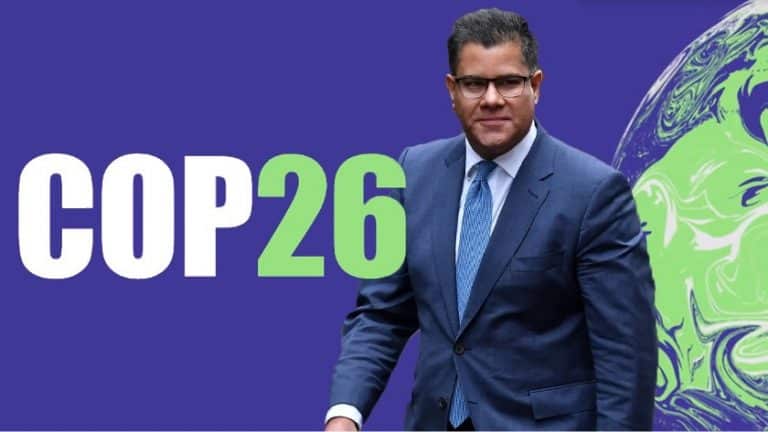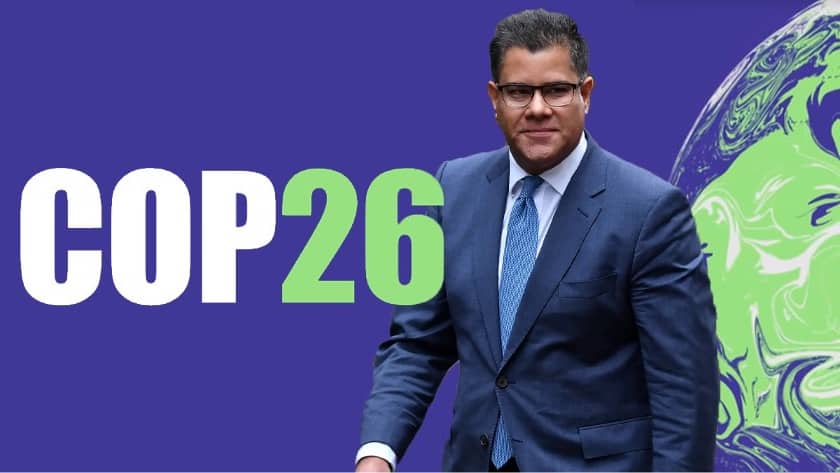
GLASGOW 2021, THE END OF COAL?
In the context of the Coronavirus and recovery from global recession, climate change continues to impact, and climate risks are increasing around the world. COVID-19 pandemic has brought devastation to millions around the world, disrupting many parts of the global economy. Governments all over the globe have stepped up to protect the lives and economic interests of their citizens. But climate change has continued, and it ultimately threatens life on earth. As countries begin to recover from the Coronavirus pandemic, COP26 countries must take the historic opportunity to tackle climate change at the same time – to build “back better, and greener”. As said by Alok Sharma, president of the COP, “We can deliver green recoveries across the globe that bring in good jobs, trillions in investment and ground-breaking new technology. And we must.”
The COP26 summit will bring parties together to accelerate action towards the goals of the Paris Agreement and the UN Framework Convention on Climate Change. The main point discussed this year is to keep the temperature of the planet under control – limiting its increase to 1.5 degrees. Science data dictates that by the second half of this century, the world should be producing less carbon than it takes out of the atmosphere. This is what reaching ‘net zero’ means.
Unsurprisingly, last Friday’s debate was coal dominated. As we know, coal was the main factor of the industrial revolution back in the 18th and 19th centuries. Since then, it has been at the center of industrial development all over the world mostly because of technological innovation rending the use of coal and its derivatives cheaply.
However, fresh news stated that global emissions have risen by almost 5 per cent in 2021, day four of COP26 will focus on how to decarbonize the energy sector. This news gave rise to an uncommon world alliance with the announcement that more than 40 countries have pledged to quit coal in a new pact that could be one of the key legacies of the Glasgow gathering. Moreover, the agreement includes 18 new countries that for the first time are promising to either phase out or stop investing in new coal-fired power plants domestically and internationally, including Poland, Vietnam, and Chile.
COP president Alok Sharma promised to “consign coal to history”, as the world’s biggest contributor to carbon dioxide emissions. As we said before, coal being the start of industrialization, this is extremely challenging. Another 20 countries at least are expected to sign up to quit coal. However key details on time horizons and extent still need to be discussed. Another great advancement for Sharma’s goal is that the US, the UK, and Canada have pledged to end public financing for coal overseas by the end of next year. The pledge, also signed by five development banks including the European Investment Bank, commits to spend more resources on the transition to low-carbon power. China, Japan, and South Korea have all recently announced they will not finance overseas coal plants. But they have not signed on to stop international finance for all fossil fuels.
Even if the goal is to attain “net zero” the COP 26 pledge on coal would still allow some exploitation, for example in the case of gas power plants with carbon capture and storage technology. This is based on the Paris agreement saying: “We will end new direct public support for the international unabated fossil fuel energy sector by the end of 2022, except in limited and clearly defined circumstances that are consistent with a 1.5°C warming limit and the goals of the Paris Agreement,”.
Overall, the international implication in this summit has been remarkable with most of the big producers together to sign the end of coal. However, on the other hand, some developing countries, such as Indonesia, tend to find the summit unfair. In fact, they consider that limiting their emissions in such a crucial phase of their economic, social, and most importantly industrial development will impeach them from reaching someday the status of other developed countries. On the other hand, the world’s actual situation added to the international pressure brought on by the summit implies that even if such countries may find resolutions unfair, or not aligned with their country’s objectives, they will sign the pledges. An additional challenge for developing countries will therefore be balancing national and international interests which again will create the necessity for international cohesion and agreements.
https://ukcop26.org/wp-content/uploads/2021/07/COP26-Explained.pdf
https://www.ft.com/content/f01342c5-d1af-4c36-8362-582b48767a05
https://www.ft.com/content/fb270eaa-6648-42eb-8a75-96d0f257fde3
Author: Samia Ismaili
GLASGOW 2021, THE END OF COAL?
In the context of the Coronavirus and recovery from global recession, climate change continues to impact, and climate risks are increasing around the world. COVID-19 pandemic has brought devastation to millions around the world, disrupting many parts of the global economy. Governments all over the globe have stepped up to protect the lives and economic interests of their citizens. But climate change has continued, and it ultimately threatens life on earth. As countries begin to recover from the Coronavirus pandemic, COP26 countries must take the historic opportunity to tackle climate change at the same time – to build “back better, and greener”. As said by Alok Sharma, president of the COP, “We can deliver green recoveries across the globe that bring in good jobs, trillions in investment and ground-breaking new technology. And we must.”
The COP26 summit will bring parties together to accelerate action towards the goals of the Paris Agreement and the UN Framework Convention on Climate Change. The main point discussed this year is to keep the temperature of the planet under control – limiting its increase to 1.5 degrees. Science data dictates that by the second half of this century, the world should be producing less carbon than it takes out of the atmosphere. This is what reaching ‘net zero’ means.
Unsurprisingly, last Friday’s debate was coal dominated. As we know, coal was the main factor of the industrial revolution back in the 18th and 19th centuries. Since then, it has been at the center of industrial development all over the world mostly because of technological innovation rending the use of coal and its derivatives cheaply.
However, fresh news stated that global emissions have risen by almost 5 per cent in 2021, day four of COP26 will focus on how to decarbonize the energy sector. This news gave rise to an uncommon world alliance with the announcement that more than 40 countries have pledged to quit coal in a new pact that could be one of the key legacies of the Glasgow gathering. Moreover, the agreement includes 18 new countries that for the first time are promising to either phase out or stop investing in new coal-fired power plants domestically and internationally, including Poland, Vietnam, and Chile.
COP president Alok Sharma promised to “consign coal to history”, as the world’s biggest contributor to carbon dioxide emissions. As we said before, coal being the start of industrialization, this is extremely challenging. Another 20 countries at least are expected to sign up to quit coal. However key details on time horizons and extent still need to be discussed. Another great advancement for Sharma’s goal is that the US, the UK, and Canada have pledged to end public financing for coal overseas by the end of next year. The pledge, also signed by five development banks including the European Investment Bank, commits to spend more resources on the transition to low-carbon power. China, Japan, and South Korea have all recently announced they will not finance overseas coal plants. But they have not signed on to stop international finance for all fossil fuels.
Even if the goal is to attain “net zero” the COP 26 pledge on coal would still allow some exploitation, for example in the case of gas power plants with carbon capture and storage technology. This is based on the Paris agreement saying: “We will end new direct public support for the international unabated fossil fuel energy sector by the end of 2022, except in limited and clearly defined circumstances that are consistent with a 1.5°C warming limit and the goals of the Paris Agreement,”.
Overall, the international implication in this summit has been remarkable with most of the big producers together to sign the end of coal. However, on the other hand, some developing countries, such as Indonesia, tend to find the summit unfair. In fact, they consider that limiting their emissions in such a crucial phase of their economic, social, and most importantly industrial development will impeach them from reaching someday the status of other developed countries. On the other hand, the world’s actual situation added to the international pressure brought on by the summit implies that even if such countries may find resolutions unfair, or not aligned with their country’s objectives, they will sign the pledges. An additional challenge for developing countries will therefore be balancing national and international interests which again will create the necessity for international cohesion and agreements.
https://ukcop26.org/wp-content/uploads/2021/07/COP26-Explained.pdf
https://www.ft.com/content/f01342c5-d1af-4c36-8362-582b48767a05
https://www.ft.com/content/fb270eaa-6648-42eb-8a75-96d0f257fde3
Author: Samia Ismaili
RELATED
Regulatory Developments in ESG Reporting and Their Implications for Businesses
The focus on Environmental, Social, and Governance (ESG) factors has surged, leading to significant regulatory changes worldwide. Key developments include the EU’s Corporate Sustainability Reporting Directive (CSRD), the US SEC’s...
Read MoreThe Earthshot Prize 2022
The Earthshot Prize 2022 The Earthshot prize is an award given to five winners that created some projects that could help our planet face some of the most important challenges...
Read More

